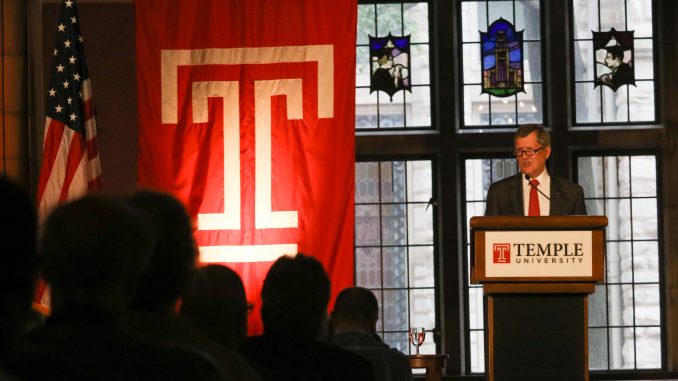
Richard Englert, the university’s acting president, said in a speech Thursday that the university would cap the number of merit scholarships given for future incoming classes of students.
Temple’s merit scholarship program doles out money to incoming students based on their high school GPAs and their SAT or ACT scores. The program was a pivotal detail in administrative changes this summer, when former President Neil Theobald fired his Provost, Hai-Lung Dai, blaming Dai for a $22 million deficit in merit scholarships. The Board of Trustees later voted “no confidence” in Theobald, alleging that he hid the deficit from the Board for about a year.
“I know the news of our budget overrun in scholarships was a cause of concern this summer,” Englert said, during the annual State of the University Address in Mitten Hall’s Great Court.
Englert added that the program was intended to attract top students to Temple, and that this year, the number of freshmen with high school GPAs of 3.6 or above rose 17 percent. He added that the deficit in the program was closed through reallocations and cuts, but all students qualified for the program in the Class of 2020 received their scholarships.
While giving the address to about 250 faculty, administrators, staff and students, Englert was framed among two towering Temple flags and the bust of university founder Russell Conwell. He echoed the message and motifs of speech at convocation last month, stating that the university has “great momentum” and that faculty are “Temple’s most cherished resource.”
“There has never been a better time to be at Temple University than right now,” he said.
Englert also spoke about two academic initiatives begun during Theobald’s tenure: “Fly in 4,” the program to garner commitments four-year graduation, and the Temple Option, which allowed students to apply to the university without submitting standardized test scores.
Englert said that the initiatives would continue, but would be reviewed to “make sure they are achieving their goals.”
In the spring, the university will review its decentralized budgeting system, which began shortly before Theobald arrived from Indiana University. In that system — which is also in place at IU — university offices and the schools are responsible for their own revenues and expenses. Schools and colleges within the university receive tuition directly, and those schools’ administrators can decide where to allocate the money.
Later, after mentioning that the university hired 176 full-time faculty for this school year, Englert introduced several administrators: the recently appointed College of Liberal Arts Dean Richard Deeg; the interim dean of the Beasley School of Law, Gregory Mandel; the Chief Information Officer, Cindy Leavitt; and JoAnne Epps, who Theobald appointed from the law school as Provost.
Englert concluded the speech after showing attendees a video from a new marketing campaign that focuses on “A World Without Temple.”
Joe Brandt can be reached at jbrandt@temple.edu or on Twitter @JBrandt_TU.


Be the first to comment